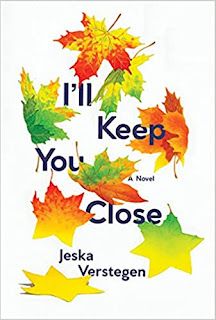Jeska Verstegen is the author of I'll Keep You Close, a new middle grade novel for kids. The book, based on her family history, was translated from Dutch into English by Bill Nagelkerke. A writer and illustrator, she lives in the Netherlands.
Q: The Kirkus Review of your book describes it as “Multigenerational trauma artfully revealed from a child’s point of view.” What do you think of that description, and why did you decide to write this book based on your own family history?
A: I liked their description a lot. It’s very accurate! “Multigenerational trauma” is a good definition. In the Netherlands it’s called “The Second Generation problem,” a well-known psychological term for the subject of the story I'm describing.
A trauma that one generation experiences will leave its mark on the next. You'll be influenced by this as a child growing up in the generation that follows. It changes, somehow, who you are, and how you perceive the world.
There are several books for grownups on this subject, but it was (to my knowledge) never discussed in a children’s book. I thought it was relevant to do so, because the subject is so topical today.
Feelings are universal; we're all familiar with these kinds of difficult feelings one way or another. That's why children and adults can relate to the leading character in I’ll Keep You Close.
At a certain age I realized my upbringing was a bit different. Maybe because of my creative mind, I started observing my own reactions very carefully.
I am by nature rather analytic, so I tried to analyze where some of my basic feelings came from. I realized my upbringing had a great influence on who I am today. I thought I should acknowledge and cherish this family history, so I started writing.
When I wrote, a lot of things that happened in the past fell into place; I was able to empathize more with everyone involved.
It was some kind of urge to share this process with the world around me. A lot of people carry intense stories with them all through their lives and I felt it was so important to share and talk about it. Rather than keep quiet, as I used to...
Q: How were you affected by writing the book?
A: I was so grateful for the positive reactions I received. I can honestly say, when I was writing, I was scared to open up and show the world my story. It felt almost like being naked.
But the reactions were beautiful. My honesty even inspired people to share their feelings and stories with me. It encouraged people to open up, which I found absolutely wonderful.
One man (65 years old) told me he gave the book to his brother. Because of it they started talking about their difficult upbringing. I was so thankful the book was somehow a bit like a door; people can open it very carefully, take a look inside, and talk about what’s in this hidden room in your mind.
The act of writing the book gave me a lot, too. It gave me permission to be who I am. We should all create what feels true to who we are. It sounds a bit silly maybe, but we all are inclined to hide behind facades… It’s a shame.
Because I wrote the book, I had to empathize with everyone I described. I learned new things by doing that, like you always do if you try to envision yourself in the position of another. For instance: I realized how lonely my mother must have felt. Maybe she was even a bit imprisoned by her loneliness.
Q: How was the book's English-language title chosen, and what does it signify for you?
A: Bill did a fantastic job translating. We had a lot of contact during the process. The editor, Meghan, was wonderful, too. They collaborated magnificently.
The title is based upon the Dutch title. And when I was writing I had a lot of ideas for it. But none of them were quite right. Then, one blissful day, it all fell into place, and the right title revealed itself.
The people in the book all truly exist(ed). I felt an obligation to them all to be respectful and show that I will keep them close no matter what. This book is about trying to grasp what motivates people, why they do things as they do. Why do they become who they are. It’s a story about observing, not judging.
That’s why “I’ll Keep You Close” is a wonderful translation… I think of it as referencing the place in your memory where you guard your loved ones.
Q: What do you hope readers take away from the book?
A: It would be very special to me if it got people try to empathize with those around them. Try not to judge. When something hurts you, you should try to talk about it with someone you can trust.
I would like to invite people to talk about their feelings. It's very important, I think, to talk and to really listen to each other. When you’re feeling alone, remember you don’t have to be. Talking can lift that dark feeling of loneliness.
And I feel it's my personal obligation to keep this (his)story alive, we should not forget. War is always very, very tragic, and even when the war ends, it doesn’t really… Because its aftereffects ripple into the next generations.
Q: What are you working on now?
A: I’m working on several things! Illustrations, because I’m an illustrator too. Maybe you would like to take a look at my Instagram page? This is the address: https://www.instagram.com/jeska_verstegen/?hl=nl
And… I’m writing my next book. It’s a story about growing up and making choices. I can’t tell you everything yet! But it will be a bit different. And maybe somewhat happily strange….
Q: Anything else we should know?
A: Well, let me think…I wish everyone a creative mind, and encourage you to use your imagination! It makes your life so much more colorful. Even during the difficult times, when life challenges you.
Please take care, all of you out there.
--Interview with Deborah Kalb


No comments:
Post a Comment